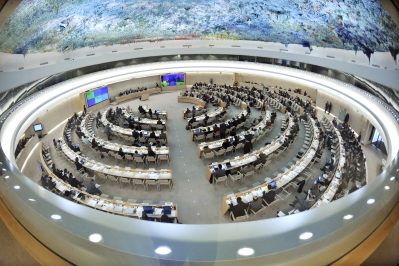Mr. President,
I am delivering this statement on behalf of FIDH, ARTICLE 19, Reporters Without Borders, the Cairo Institute for Human Rights and FORUM-ASIA.
In 2011, by adopting resolution 16/18, this Council departed from the divisive and human rights incompatible concept of “defamation of religions”, in favor of a human rights approach. However, in 2015 we continue to witness attempts by governments to act directly against the spirit of resolution 16/18, challenging international standards and the universality of human rights on the basis of so-called “traditional values” or national, cultural or religious particularities. In parallel, in many parts of the world, we have seen an upsurge of movements targeting people for violence and discrimination in the name of national, cultural or religious protectionism.
The importance of states maintaining consensus on the principle that freedom of expression and freedom of religion or belief are mutually dependent and reinforcing cannot be lost. States must demonstrate their commitment to resolution 16/18 and deepen the consensus behind it by implementing it at the domestic level.
The “Istanbul Process” must be re-energized to support this process, and involve the full and effective participation of all stakeholders essential to giving effect to the package of practical measures recommended in resolution 16/18. To lead by example, states must utilize the Rabat Plan of Action to practically guide the legal and policy measures they initiate on the ground.
The Rabat Plan of Action embodies the principle that the exercise of the right to freedom of expression is the rule and prohibition of speech should be the exception. It places the onus on the state to prevent discrimination not through censorship but through promoting dialogue and mutual understanding.
It further affirms that prohibitions on “incitement”, as understood under Article 20(2) of the ICCPR, cannot be a pretext to curtail criticism of the state or abstract ideas, religions or beliefs, or to limit dissent or open debate. Such prohibitions are only legitimate to the extent that they are compatible with the rights to freedom of expression and non-discrimination.
We call on states to repeal blasphemy laws, as recommended in the Rabat Plan of Action and by the Human Rights Committee, since such laws are “counter-productive” and “may result in censoring religious dialogue and healthy debate”. They can also be used to target minorities, political opponents and independent voices and stifle them.
Now more than ever, it is crucial that states give life to the promise of resolution 16/18 and affirm that freedom of expression and freedom of religion or belief are rights for all people.
Thank you.
Click here to download the oral statement (PDF)





